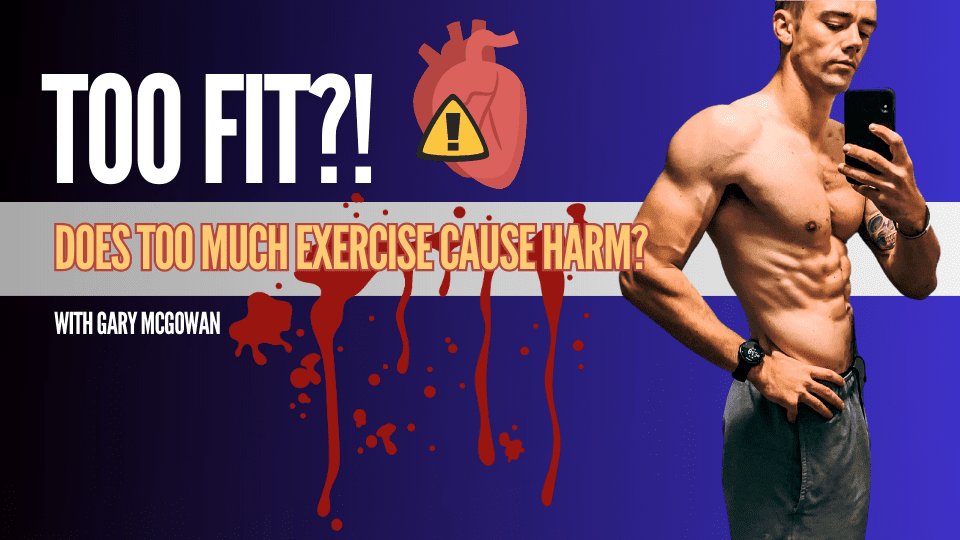Can you be too fit for your health? That’s the question that we’re going to answer today and the reason I want to answer this question is not because there are loads of people out there thinking that they shouldn’t exercise because it’s unhealthy. But rather that there have been a number of news headline studies discussing these concerns among fit people, that make them wonder; “Am I doing too much for my health? Am I actually putting my heart at risk? Am I putting my health at risk? Am I going to get a heart attack from putting all this pressure on my heart?
Well, let’s answer this question!
Can You Be Too Fit?
So firstly, we should start by saying that exercise is healthy. I’m sure you know that, but it’s important to realize that. It’s important to realize that exercise continues to benefit your health up to very high levels, and this is a really important point to impress on during this discussion.
Because what we see when we look at the research is that even up to Elite levels of VO2 max, which would be a marker of cardiorespiratory Fitness, we see a reduction in mortality or an increase in survivability. So we see this in terms of the outcome itself, and by outcome in this sense, I mean VO2 max, a marker of cardiopulmonary fitness.
Now the outcome and the process are two separate things. So the process would be how much one is exercising. For example, in the general exercise guidelines for health, what we see are recommendations to aim for 150 to 300 minutes of moderate-intensity aerobic exercise per week and two resistance training sessions. That’s kind of the baseline recommendation for health.
Now the question is, is there a risk of going beyond that? The answer again seems to be null. We see people doing two, three, four, five-plus times the recommendations and continuing to benefit from a health perspective. So even when someone is doing up to 10 hours per week of aerobic training, they’re continuing to get health benefits from doing so. Of course, there’s a tapering point, but it doesn’t seem to be the case that by doing a couple of extra hours over the guidelines per week that you’re putting yourself at any risk. And even if you’re doing the volume of training that an endurance athlete might be doing, we don’t really have any evidence to say that that’s putting your health at risk.
We can also look at studies of athletes in terms of their survivability. Do athletes generally live longer? The answer is yes, athletes tend to live longer than the general population. So we’re not really seeing that doing too much exercise, being too fit, or being an athlete confers some sort of risk on one’s health.
But there have been some signals that might make one concerned. And before we get into this part of the discussion, I want to make clear that when you’re interpreting the health outcomes of an athlete, it must be done differently from someone from the general population because athletes have changes in their blood results, in their electrocardiograms, obviously in their body composition, their joints, etc., that would be potentially pathological if observed in a normal person but are not pathological in the context of this being an athlete.
An example of that would be derangements in liver blood tests, liver enzymes that could be pathological if you didn’t know that this was an athlete who had just been training. Along with that, there are many adaptations in the cardiovascular system and the heart, in particular, that can be observed in both echocardiography (ultrasound of the heart) and an electrocardiogram (ECG).
Athletes naturally will have changes on these examinations that may be pathological in the average person but are normal physiological adaptations to exercise in the athlete. When you do an ECG on an athlete, you can find findings like an increase in a PR interval. This is basically something that is referred to as first-degree heart block. That sounds very serious, but it’s actually something that’s fairly prevalent in athletes and isn’t of any consequence.
So, with that said, one of the things that has made the headlines in recent years has been findings in athletes in their arteries of coronary artery calcification. Generally, what happens during the atherosclerotic process in normal general population individuals is they will get the deposition of lipids or fats within the walls of the arteries over many years. This will eventually become a more complex process involving the immune system and will also lead to calcification on top of that plaque.
But in athletes, what we see is a much higher rate of these so-called calcified plaques as opposed to the mixed plaques where you’ve got calcification but also a lot of lipid. So in athletes, what you see is a higher proportion of these calcified plaques. And this is, I should say, particularly relevant to endurance athletes.
And what we know is that generally these plaques that are of a calcified nature, as opposed to a mixed or lipid-rich nature, are typically at a lower risk of plaque rupture and thus a lower risk of cardiovascular events. When we see this prevalence of calcified plaques in athletes, we can first start by saying, “Okay, well, these probably aren’t of as much concern as if these were mixed plaques that we were observing.”
But further to that point, it’s also important to consider why an athlete might have a higher rate of coronary artery calcification. So if you’re an endurance athlete and you’ve got all this blood forcefully being pumped around the body potentially for hours at very high rates per minute, you’ve obviously got a lot of stress on the vascular system. It’s hypothesized that as a result of all this blood flow, the arteries are effectively adapting through this calcification process to allow them to tolerate the stress and strain of all that blood flow over the years.
This is not to say that it’s a totally benign finding. It’s not to say that if you’re an athlete you can’t get atherosclerosis. But rather to say that when we look at these outcomes in athletes, it should be considered in the context that they are an athlete and that the coronary artery calcification that’s observed in, let’s say, a young fit individual might not be of the same significance as a 55-year-old obese male who’s constantly eaten a poor diet and is generally inactive.
Too Fit For Your Own Good?
So to summarize the topic, the core question is: Can you be too fit for your health? In most cases, no. You’re not at higher risk of cardiovascular events. You’re not at a higher risk of death from any other cause. You’re likely to live longer the more you exercise and the fitter you get. All of those things seem to hold true.
So at this point in time, we don’t have much evidence to suggest that there’s an upper limit of fitness that can be attained. This goes against the extreme exercise hypothesis, which posits that there’s a U-shaped relationship here where when you get up to very high levels of exercise, your risk of health problems actually begins to increase again. We just don’t see much evidence of that being the case.
Of course, depending on the sport, there might be individual risks and there might be other factors that put athletes at risk, such as taking performance-enhancing drugs or early retirement and the subsequent lifestyle that they live or the individual sport they do. As I said, might confer risk. So if you’re doing a sport that puts you in a position where you might get a fracture or a spinal injury or these types of things, of course, there are going to be other things that pose a risk to your health. If you’re a swimmer, there might be sharks in the water. If you’re running through the desert, you’re dealing with heat stress and a very difficult environment.
But this goes above and beyond the question of “can you be too fit?” Fundamentally, it doesn’t look like you can be too fit. It doesn’t look like it’s something that most of us have to worry about. There might be cases where the stress of exercise unmasks an underlying cardiovascular condition, like a genetic cardiomyopathy or arrhythmia, but for the most part, I don’t think you or I need to be worried about getting too fit anytime soon. It’s probably going to be beneficial.
If you need help with your own training, and managing your fitness, then online coaching may be for you. If you are interested in learning more about your nutrition, sleep, or stress management, we have lots of content on our website to help you with those topics. We also have lots of videos on our YouTube channel that may interest you!

Gary McGowan
Hey, I am Dr Gary McGowan, co-founder of Triage, qualified Doctor, Physiotherapist, and Coach.
Having graduated with first class honours in Physiotherapy (BSc) and Medicine (MB BCh BAO), I aim to blend medical science with a decade of coaching experience to help you maximise your performance, transform your body, and optimise your health.
I enjoy grappling, hiking, lifting, and other modes of physical training. When I’m not training, I like to read broadly, particularly philosophy, religion, and history. I love the natural world, particularly the mountains & lakes of my hometown Killarney, County Kerry.


